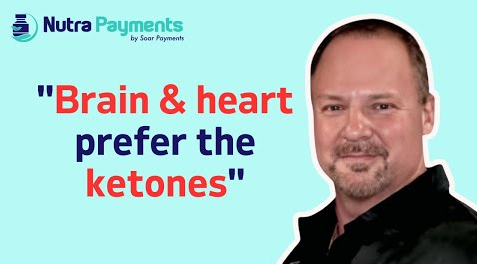To view the original article about the ketogenic diet and intermittent fasting, click here!
I’ve been training since I’ve been about 13 years old, and I started by competing in powerlifting in the 1990s. Nutrition advice for powerlifters at the time went something like this: eat as much as you can as often as you can, even if you aren’t hungry. Normally, this was shortened to two words: eat more. I followed this advice throughout my high school years and later as I reentered the iron sports after my stint as a Marine Corps infantryman where it was pretty impractical.
Given the fact that this was how I was brought up in strength training and fitness, I was naturally skeptical when I heard about intermittent fasting a few years ago. How could someone gain muscle, lose fat, and perform better by not eating?
That being said, two things drove me to try it: I was broke and couldn’t afford the 8 meal a day bodybuilding diet I was doing, and I had ulcerative colitis and every time I ate I ended up running to the bathroom in excruciating pain.
Since trying intermittent fasting in combination with a low carbohydrate ketogenic diet, I’ve never gone back to my old bodybuilding template. My ulcerative colitis is in remission, I have more energy throughout the day, I think better, and I have way more endurance than I ever did. I’m also stronger, leaner, and I’m able to retain muscle mass much better during fat loss training cycles.
But how and why is this possible? The next few sections will take you through the reasons why and how intermittent fasting works.
What is Intermittent Fasting?
To begin, I want to clear the air on something. Intermittent fasting isn’t simply “not eating.” You have to eat some time, and if you don’t the result is malnutrition and eventually death. Rather, intermittent fasting is eating within a set time period or “window” during your day.
Additionally, intermittent fasting is nothing new. In our evolution, humans classically experienced time periods without food throughout our existence. Fasting is also a component of almost every major religious practice and has been for thousands of years. It’s only in recent years, through the onset of modern technology, that we’ve even been capable of having food available to us 24 hours a day. With this has also come a plague of diabetes and heart disease on our modern population.
Also, unless you are awake at all hours of the night eating, you’re currently already performing a form of intermittent fasting because you don’t eat while you’re sleeping. Hence the word breakfast or “break fast.” The problem is that, for many of us, the first action of our day is to load ourselves with food that gives us an insulin spike, and this shuts down many of the beneficial hormonal processes that allow our brains to function optimally and our metabolisms to operate efficiently. We’ll get into this a bit more in a bit.
Intermittent fasting is also not a diet. You can do intermittent fasting whether you’re a vegan, a paleo practitioner, or while following a ketogenic diet. Intermittent fasting simply describes a series of protocols for fasting windows.
The more popular protocols include:
- The 16/8 Method: Fast for 16 hours each day, for example by only eating between noon and 8pm. This has been popularized by the Lean Gains program.
- Eat-Stop-Eat: Once or twice a week, don’t eat anything from dinner one day, until dinner the next day (a 24 hour fast).
- The 5:2 Diet: During 2 days of the week, eat only about 500-600 calories.
I tend to use the 16/8 method, but I also incorporate a 24 hour fast at least twice a month normally after a cheat meal.
During fasts, food is not allowed, but most practitioners will consume water, coffee, tea, and other non-caloric beverages, though some experts, like Dr. Rhonda Patrick also restrict caffeinated beverages because caffeine must be metabolized by the liver.
Most supplements are allowed during fasts, and some can even help increase the benefits of the fast. Real Ketones, for example, while give you a boost of energy through ketones, which do not spike your insulin, and also provides acetyl l-carnitine, which will help you to mobilize your fat stores for energy. I would not, however, consume whey protein powder during a fast as it will give you a sizable insulin spike that could ruin the benefits of fasting.
Why Does Intermittent Fasting Work and What are the Benefits?
Fasting helps to increase muscle mass by raising testosterone levels through hormonal balance.
A lot of us equate eating with building muscle, but it turns out that our bodies actually get far more anabolic during periods where we do not eat. This is largely a result of the interactions between hormones. Eating triggers a release of the hormones leptin and insulin.
Leptin is released by your fat cells when you eat a large amount of calories. Its job is to tell your brain that you’ve just taken in a bunch of energy, that you have enough fat stored, that you can stop eating, and that you can burn calories at a normal rate. As such, healthy leptin secretion is essential for regulating your metabolism. However, leptin is also antagonistic to DHEA, a precursor to testosterone, and higher levels of leptin have been associated with lower testosterone levels in men.
As such, you want a diet that promotes healthy leptin secretion, but not so much that it either causes leptin resistance, where the brain stops responding to leptin stimulation due to there being too much in your system or lower levels of DHEA and testosterone. Incorporating an intermittent fast as a regular practice is one way of striking a balance between these two important hormones where you can get the metabolism-regulating effects of leptin, and the testosterone boosting effects of your own DHEA secretion.
Fasting optimizes your growth hormone production by regulating insulin secretion
In addition to leptin, we also secrete insulin when we eat. Insulin is a hormone released by the pancreas that helps to regulate our blood sugar. Basically, when you eat, insulin attaches itself to sugar and helps to unlock your muscle cells and liver cells to store the sugar as glycogen. Without insulin, or if our cells stop responding to insulin due to too much exposure to the hormone, insulin must begin storing these sugars in your fat cells. If sugar remains high, insulin levels drive up and decrease cell sensitivity even more, and this will drive up your blood sugar levels. This eventually leads to the disease diabetes, a dangerous disease that is currently plaguing our society.
But insulin also has another effect that can increase fat storage and decrease your ability to build muscle: it decreases your ability to produce growth hormone. When insulin is in the bloodstream, the production of growth hormone gets driven down. During periods when insulin is not present, growth hormone production gets optimized and this has been confirmed by studies showing an increase in growth hormone secretion during fasting periods.
Hence intermittent fasting is an important tool, not only for efficient glucose metabolism but also for optimal growth hormone production.
Fasting Can Help to You to Adapt into a State of Ketosis More Quickly and Give You Superhuman Brain Energy
Fasting can also help you to adapt to ketosis relatively quickly. With the absence of glucose in your bloodstream, your brain will require energy from somewhere. As such, your body will begin to mobilize your fat stores into your bloodstream and your liver will begin to convert these lipids into ketones to provide your brain with much-needed fuel. Unlike glucose, which tends to fluctuate in the bloodstream, causing varying levels of energy, ketones are supplied to the brain more steadily, giving you constant brain energy. Hence, people who follow ketogenic diets or who achieve ketosis through fasting, actually report higher energy levels, better moods, and sharper mental acuity than those who fuel themselves with carbohydrate.
Fasting Can Help Extend Your Life and Your Quality of Life
Although robust studies have yet to be conducted on the effect of intermittent fasting on lifespan, some studies have shown promising evidence that fasting could increase the length of your life and the quality of your life into old age. Of course, I’ve already mentioned the benefits derived from increased insulin sensitivity and optimized glucose metabolism, but there are other potential benefits from fasting as well. Studies on mice have demonstrated that fasting mice have higher levels of Brain Derived Neurotropic Factor (BDNF), which is a protein that keeps stressed neurons from dying.
Fasting also seems to ramp up cellular autophagy, which is a garbage disposal like symptoms that kills off the damaged molecules commonly associated with neurological diseases like Parkinsons and Alzheimers. And while more studies need to be conducted on the effects of intermittent fasting on mortality and morbidity, a common thread throughout lifespan studies is that those who eat lower calorie diets live longer. Intermittent fasting may provide a way of experiencing the benefits of periodic calorie restriction while still being able to feast during periods when you are not fasting.
Conclusion
Though you may be skeptical about it’s benefits, the science demonstrates that intermittent fasting could help to make you leaner, more muscular, more energetic, and healthier by balancing your hormones, increasing your insulin sensitivity, and increasing cellular health. I should also note here that Kegenix can be a great tool for helping you through your fasting periods by giving your brain fuel through ketones and helping you to mobilize your own fat stores to create more ketones.
Additionally, if you are interested in learning how to optimize your diet for health and mental and physical performance through ketosis, check out Warrior Soul Keto Camp. It contains everything you need to know to get into ketosis quickly and leverage its benefits to burn fat and attain superhuman performance including: a full adaptation nutrition program, a full maintenance nutrition program, 12 weeks of workouts, a 30 recipe cookbook (that includes recipes for keto desserts like pumpkin pie and cheesecake), and the opportunity to work with experts who will help you along your way!

 ACCOUNT
ACCOUNT
 CART
CART





